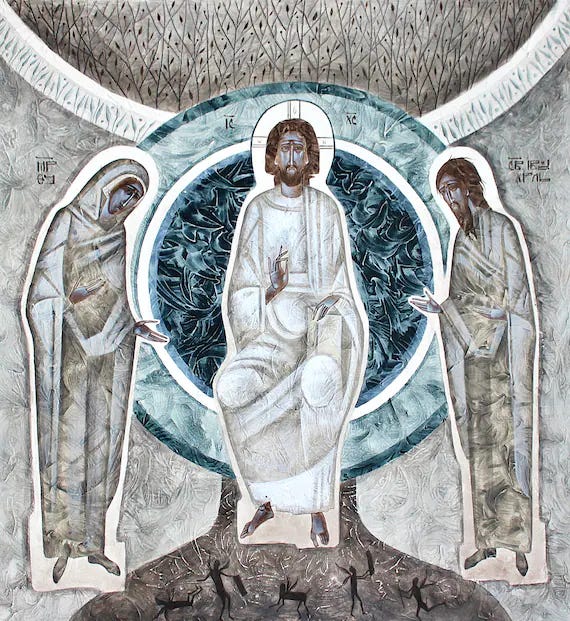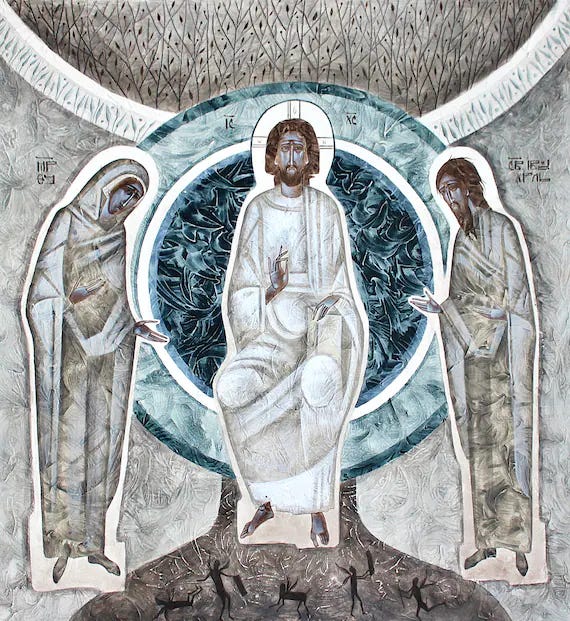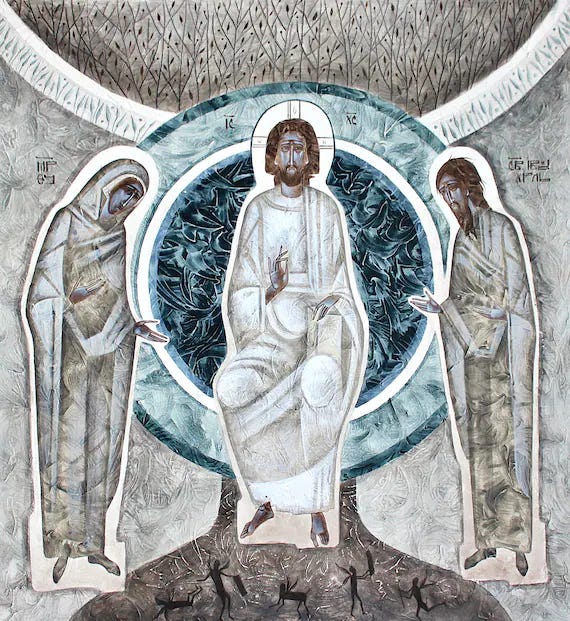Apocalypse Later
Why does Advent endure? Why does God give more time?
The church begins a new year this Sunday with the start of the Advent season. The assigned gospel for the first Sunday of Advent is the “Little Apocalypse” in Mark’s Gospel, chapter 13:
"But in those days, after that suffering, the sun will be darkened, and the moon will not give its light, and the stars will be falling from heaven, and the powers in the heavens will be shaken. Then they will see 'the Son of Man coming in clouds' with great power and glory. Then he will send out the angels, and gather his elect from the four winds, from the ends of the earth to the ends of heaven.
"From the fig tree learn its lesson: as soon as its branch becomes tender and puts forth its leaves, you know that summer is near. So also, when you see these things taking place, you know that he is near, at the very gates. Truly I tell you, this generation will not pass away until all these things have taken place. Heaven and earth will pass away, but my words will not pass away. "But about that day or hour no one knows, neither the angels in heaven, nor the Son, but only the Father.Beware, keep alert; for you do not know when the time will come. It is like a man going on a journey, when he leaves home and puts his slaves in charge, each with his work, and commands the doorkeeper to be on the watch. Therefore, keep awake--for you do not know when the master of the house will come, in the evening, or at midnight, or at cockcrow, or at dawn, or else he may find you asleep when he comes suddenly. And what I say to you I say to all: Keep awake."
Isn’t it funny how we persist in thinking of Jesus primarily as a teacher of golden rules and a dispenser of good deeds?
Jesus's longest discourse, by far, in Mark’s Gospel is this sermon that makes Halloween seem tame by comparison.
During his three year ministry, Jesus has spent a lot of his time at the temple; so that, by the time we get to the cusp of the passion story, Jesus is like Peter Finch in Network. He’s mad as hell and he’s not going take it anymore.
Jesus has just been condemning the temple guild for “devouring the homes of widows,” widows like the old lady with the pocket change she set aside from her old man’s pension. Yet the disciples manage once again to miss the point. As soon as they march out of the temple Jesus has just condemned as the first century equivalent of a payday lender, the disciples start admiring its architecture.
"Teacher, look, what large stones and what large buildings!”
“Let me tell you about those buildings. It’s all going to come crumbling down.”
Jesus says no more until they come to the Mount of Olives, the place where the prophet Zechariah had proclaimed God’s messiah would commence his saving work. “Lo, the Day is surely coming,” Zechariah prophesies, “On that day the Lord’s feet shall stand on the Mount of Olives, which lies before Jerusalem on the east; and the Mount of Olives shall be split in two.”
Stones will be turned, one upon another.
So it’s not surprising that, as they sit on the Mount of Olives looking across the valley at the edifice Christ has just said will soon be eradicated, they’d get to thinking about what Zechariah called the Day of the Lord, the time when God will come again to judge the quick and the dead. No sooner has Jesus just predicted the temple’s destruction than they’re sitting at ground zero for God’s mushroom cloud-laying messiah. In other words, it’s a rather obvious question the disciples ask.
“When?”
“‘Tell us, when will this be, and what will be the sign that all these things are about to be accomplished?’”
And immediately Jesus cracks the whip, chastising his disciples “Do not be led astray by asking ‘When?’”
“Only the Father knows the day and the hour,” Jesus preaches at the end of his fire and brimstone sermon.
That is—
“When?” is a question that cannot be answered; therefore, “When?” is a question that should not be asked.
Do not be led astray by the when question, Jesus warns.
There will be wars and rumors of more. There will be earthquakes and famines and floods. There will be plagues and pandemics and polarized families. There will be grifting prophets and phony preachers. It’s going to get worse before God makes all things new. All the bad that’s certain to be is but the beginning of the birth pangs.
Do not get distracted, trying to read the signs of the times, Jesus scolds.
Do not get preoccupied, attempting to make predictions, Jesus reprimands.
Do not be led astray by asking “When?”
When are you coming again?
When will be the End?
Nonetheless, Jesus would make an absolutely horrible HR director. He’s a rotten evaluator of talent. Down through the years, the rest of his recruits have proven to be every bit as bad at heeding his words as the initial dozen.
I mean— despite this unambiguous rebuke from Jesus, for two thousand years his friends have frittered away their time and squandered much of their witness, busying themselves with the one question Christ Jesus commands us clearly not to probe.
When will this be?
What will be the signs of the end time?
For example, the year 500 AD proved too auspicious to avoid speculation. Long before Dan Brown or that purple haired lady on the Trinity Broadcasting Network, ancient Church Fathers— legitimate thinkers and leaders— like Hippolytus of Rome and Irenaeus of Lyon predicted Christ would come again in the year 500. And they attempted to prove their prediction by “decoding” the dimensions of Noah’s ark. Pope Sylvester II predicted the apocalypse would occur at the turn of the first millennium, Y1K. When Jesus did not come again to judge the living and the dead, Sylvester and others regrouped and insisted that the only detail they’d gotten wrong was the starting point. The End would come not a thousand years after Jesus’s birth as they’d thought but a thousand years after his death, 1033 AD. Joachim of Fiore was a Catholic mystic who discovered what he called the secret “eternal gospel” in the Book of Revelation, 14:6. According to him, Christ would come back and inaugurate the Age of the Spirit in 1260 AD.
Flash forward a couple hundred years and it gets worse.
Thomas Muntzer was an Anabaptist in Germany— a Mennonite— who scoured the scriptures to interpret the signs of his time. Muntzer became convinced that the world teetered at a tipping point. He predicted that the New Age would arrive in the year 1525. The revolutionary furor his prediction unleashed ignited a violent rebellion by the peasants in central Germany. The revolt was quelled with equally great violence. The when question led Thomas Muntzer was led astray and before he knew it ploughshares and pruning hooks were being beaten into swords.
John Wesley, the founder of the Methodist movement— otherwise, kind of a normie guy, he got led astray too. He read a verse— a single verse— in Revelation and came to the conclusion that the apocalypse would be in 1836. Not long after Wesley, a Baptist preacher named William Miller led a movement of believers called the Millerites.
William Miller got more specific than any Christian heretofore had dared. Based on his idiosyncratic reading of Daniel 8, William Miller insisted that the Lord would return (to upstate New York) on October 22, 1844. As it turns out, the most remarkable event that happened on October 22, 1844 was that President James Polk had urinary bladder stones removed. Well, the bladder stones came in second place after what the press dubbed “The Great Disappointment” referring to Miller’s failed prediction. The Great Disappointment didn’t stop William Miller though; his movement of Millerites became known as the Seventh Day Adventist Church.
Christians on cable television went nuts as the year 2000 approached. When Barack Obama became president, Jerry Falwell predicted the End was nigh.
And maybe you recall—
Family Radio host and self-taught Bible expert, Harold Camping, predicted the rapture would happen on May 21, 2011, paving the way for the destruction of the world’s remaining sinners a few months later on October 21, 2011. Harold Camping led hundreds, likely more, so astray they quit their jobs, left their families, sold their homes, and cashed out their 401Ks in anticipation of the end times. As a result, one of Camping's coworkers committed suicide.
“‘Tell us, Teacher, when will this be, and what will be the sign that all these things are about to be accomplished?’”
When it comes to Christ’s Second Advent, there’s a better question to ask than “When?”
Not only is it a better question to ask, it’s a question Christ does not forbid us to ask.
The question we should ask is not “When?” but “Why?”
Why has the End with a capital E not yet come?
Why has Christ not yet come again?
Why does God give more time?
Remember—
The Bible is absolutely unique in the history of religion. Unlike the paganism of ancient Rome and Greece, the scriptures do not view the universe as eternal. Likewise, the Bible departs from eastern religions which understand existence as circular, an endless cycling loop of reincarnations. No, the Book of Genesis and the Gospel of John alike claim that creation had a beginning. Before anything was God spoke all that is into existence. Creation had a beginning and, thus, creation will have an end.
Time, according to Christianity, is less like the reliable constancy of grandfather clock and more like the sand in an hour glass.
Time will run out.
Just as there was a first day, one day there will be a last day. God is bringing history to a head. This is what Paul means when he writes to the Church at Rome, “Your salvation is nearer than when you first believed.” As we pray at the table, one day Christ will come back in final victory, time will be transformed into glory, and we will, as the catechism puts it, enjoy him forever.
Why the meantime?
Keep reading with a 7-day free trial
Subscribe to Tamed Cynic to keep reading this post and get 7 days of free access to the full post archives.




